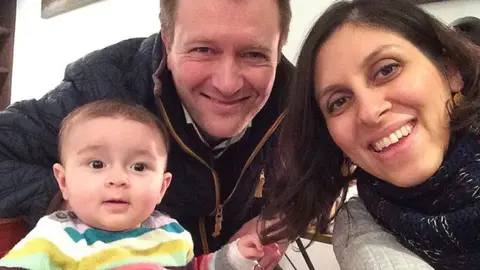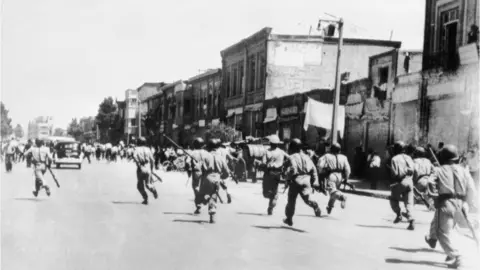Nazanin Zaghari-Ratcliffe: Prisoner caught in Iran power struggle
 PA
PAThe case of Nazanin Zaghari-Ratcliffe is first and foremost a story of terrible personal suffering for a young woman, her husband and their baby girl.
Eighteen months into a five-year sentence, Mrs Zaghari-Ratcliffe faces the prospect of up to 16 years in an Iranian jail.
It is also, however, a story of an internal power struggle in Iran, as well as of the nation's deeply difficult relationship with the UK.
To understand how she fits into this, the first thing to examine is the timing of her arrest. Mrs Zaghari-Ratcliffe was detained in April 2016, a few months ahead of the first anniversary of Iran's historic nuclear deal.
The accord, on which President Hassan Rouhani had staked his reputation, was bitterly opposed by elements of the powerful Revolutionary Guards.
They had often benefited financially from the sanctions regime. They were adamant that the nuclear deal must be seen as a failure, that it had changed nothing and that compromise with the West was a fruitless exercise.
Arrests of a number of Iranians with dual nationality came about in this context:
- Siamak Namzi, an Iranian-American businessman, was detained in October 2015
- Nazanin Zaghari-Ratcliffe, a charity worker, was held the following April
- Homa Hoodfar, a Iranian-Canadian academic, was detained in June last year.
Hardliners hit back
Iran is in the grip of an ideological power-struggle, with two competing world views.
President Rouhani came to power promising to open Iran up to the world; the supreme leader, the Revolutionary Guards and the judiciary have a far more hardline position, both in relation to how the country should be run as well as its foreign relations.
All the arrests were seen as an attempt by the Revolutionary Guards to undermine not just the president, but the very process of thawing relations with the West.
Of the three dual-national prisoners arrested after the deal was agreed, only one has since been released: Ms Hoodfar was sent home a few months later on what the Iranians called "humanitarian grounds".
The only significant difference between her case and Mrs Zaghari-Ratcliffe's was their nationalities: one was half-Canadian, the other half-British.
Deep-rooted suspicion
To Iranian minds, the UK is viewed with almost unique suspicion. Indeed, in 2009 the supreme leader said that of all the world's "arrogant powers", the UK was the "most evil".
To understand why, one must go back to the 1953 coup-d'état that overthrew nationalist Prime Minister Mohammad Mosaddegh, returning the autocratic Shah to power. Behind it were the British and American intelligence agencies.
 AFP
AFPThis led to deep-rooted suspicions of the West's intentions; once the Shah was ousted by the Islamic Revolution of 1979, those suspicions became open hostilities. Relations have never really recovered.
Over the years there have been a number of key points, notably the 1989 fatwah calling for the death of British author Salman Rushdie. His book, The Satanic Verses, was denounced as blasphemous by the supreme leader; he called on Muslims around the world to try and kill Rushdie. The controversy led to a severing of diplomatic ties, which were not repaired until 1998.
In 2007, 15 British Royal Navy personnel were detained off the South Coast of Iran. They were paraded on TV, a show of power by Tehran, but ultimately released under diplomatic pressure.
The 2009 re-election of President Mahmoud Ahmadinejad was followed by peaceful street protests, which the supreme leader accused the West of encouraging. A number of staff at the British embassy were arrested and forced to sign confessions.
In November 2011, relations deteriorated further. After the UK increased sanctions on Iran, the parliament voted to expel the British ambassador. Before he could pack his bags, members of the hardline Basij militia ransacked the British embassy in Tehran. It did not re-open until 2014.
But, it is not just the British government that has been viewed with great hostility. Western media, most notably the BBC's Persian Service, has long been regarded with deep distrust, fear and often hatred by the hardline Iranian establishment.
For years Persian Service journalists have been harassed and intimidated by the Iranian authorities. Two months ago all the assets of 150 BBC staff, former staff and contributors were frozen for "conspiracy against national security".
And here we come to the final part of the story of Nazanin Zaghari-Ratcliffe. Many years ago, she worked for BBC Media Action, the charitable wing of the BBC. Although it has no direct connection to the BBC's Persian service, it has been used as evidence that she was in Iran for political reasons.
It is, therefore, for this reason that the recent comments by Foreign Secretary Boris Johnson were so controversial, and potentially damaging.
By stating that she was involved in "training journalists", he has given ammunition to those elements of the establishment who view her as just another example what the supreme leader described as "an infiltration project" by the West.
All the while, Mrs Zaghari-Ratcliffe languishes in Tehran's Evin jail. Her daughter, who has now forgotten how to speak English, can only see her for an hour-and-a-half a week. Meanwhile her husband Richard suffers in London.
The future of a family, half-British, half-Iranian, has been torn apart by the suspicion and distrust caused by their own countries' pasts.
